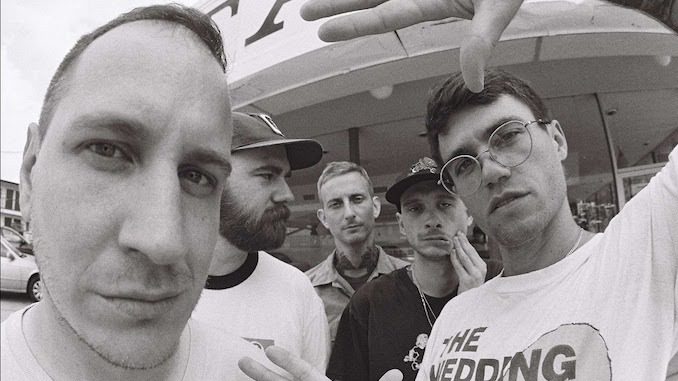When Black Country, New Road released their debut album For the first time last February, they’d been sitting on the material for at least a year; songs like “Athens, France” and “Sunglasses,” though ultimately reworked on the album, had already been out since 2019. The group described For the first time as the summation of their first 18 months as a band, a helpful framing for such intricate, yet manic work. Last September, the band confirmed they had already finished a follow-up, and began playing “Bread Song” and “Basketball Shoes’’ during their live sets. These would become parts of Ants From Up There, the group’s sophomore effort. Being released just 364 days later, it’s an incredibly quick turnaround for the London septet, a result of their remarkable productivity.
If For the first time documented their beginnings, Ants From Up There is an obvious point of departure. It’s a dramatic step away from their aloof post-punk operatics towards a brighter, more assured sound. Isaac Wood’s theatrical, quavering vocals mesh nicely with the more buoyant moments on tracks like “Chaos Space Marine.” The song’s saxophone and violin stand out, pushing the song towards jazz fusion or roots rock. It sounds like a British version of Dave Matthews Band; at any moment, it could break open and become “Satellite.” “Chaos Space Marine” works exceptionally well as an opener, immersing you in the band’s new model. They claim to have attempted to write songs that were “palatable” and “three and a half minutes,” and while they don’t achieve their desired length for much of the record, “Chaos Space Marine” is just that: a tight, accessible jam from a band with a penchant for taking their time. They haven’t written a smash hit, but at least they have their first song that would feel at home on a summer concert series stage.
More than in the sound of the record, a change is noticeable in the songwriting. While Black Country, New Road were at first praised for their dry humor and wit, Ants From Up There seems thoroughly unconcerned with being funny. Wood’s early lyrics often produced vague sketches of women who only ever told us about their lifestyles or how they felt about him. However, on new songs like “Good Will Hunting,’’ we see Wood’s writing address this. He again describes his life with another nameless woman, but is now open about her unreality. Rather than depicting the trappings of wealth around his characters as fact, it’s plainly stated fantasy. “Good Will Hunting,” which starts with something approaching the THX deep note, is a standout. Following a few more subdued moments, such as the sparse single “Bread Song,” the song’s enormous drums offer a welcome change of pace.
What hasn’t changed is Black Country, New Road’s ability to create layered, intricate songs that shift and grow, never staying in one place for too long. The nearly 13-minute-long closing track “Basketball Shoes” is the best example of their style. Having undergone several revisions, its final version removes all but a passing reference to Charli XCX, who was the song’s subject in its earliest incarnation. Beginning with hushed rumbles of guitar and bass, this version of the song unravels. We get a callback to “Concorde,” and nearly halfway through, the band let loose. Quiet and then loud is a tried-and-true song structure, but one that Black Country, New Road do exceptionally well. Even after eight minutes, it falls quiet a second time. The inevitable rise sees the addition of apocalyptic choral vocals and an arrangement that would be at home in the finale of a rock opera.
The group also haven’t shied away from using pop culture references in their lyrics. Besides Charli XCX, there are repeated mentions of Billie Eilish. She becomes this record’s Kanye West, whose name Wood screamed on “Sunglasses.” Where “Athens, France” from For the first time nearly quoted the Phoebe Bridgers line, “Why do you sing with an English accent / I guess it’s too late to change it now,” “Snow Globes” semi-quotes The Killers’ classic refrain of “he doesn’t look a thing like Jesus.” “Snow Globes” spends half its runtime leaning into melancholy, with Wood’s voice in harmony with violinist Georgia Ellery’s maudlin work. When the rest of the band join with loud, chaotic, out-of-time playing, you notice that Wood just keeps singing the same way. It’s as though a fight broke out in an audience, and the man onstage ignored it all, playing through it, only getting louder to defeat the noise.
Recently, Wood announced that while Black Country, New Road will continue on as a band, he will be stepping away to prioritize his own mental health. What the group’s future incarnation will look like is unclear, but Wood’s contributions to this album remain unchanged.
Ants From Up There feels like the work of a band figuring itself out. While they may not use the term themselves, it’s hard to argue that Black Country, New Road can’t be called a jam band. Try as they might to create short, digestible tracks, they still go long; they’re never married to their songs being presented in just one way, and embrace improvisation. Sure, they come across more self-serious than the stereotypical jam band, but all the markers are there. This is a record that sees Black Country, New Road reestablishing themselves. Having been lauded by nearly every outlet following their debut, you get the sense the band are trying to reset expectations: Buried beneath their own laurels, they’re not afraid to shake them off.
Eric Bennett is a music critic with bylines at Post-Trash, The Grey Estates and The Alternative. They are also a co-host of Endless Scroll, a weekly podcast covering the intersection of music and internet culture. You can follow them on Twitter at @violet_by_hole.




